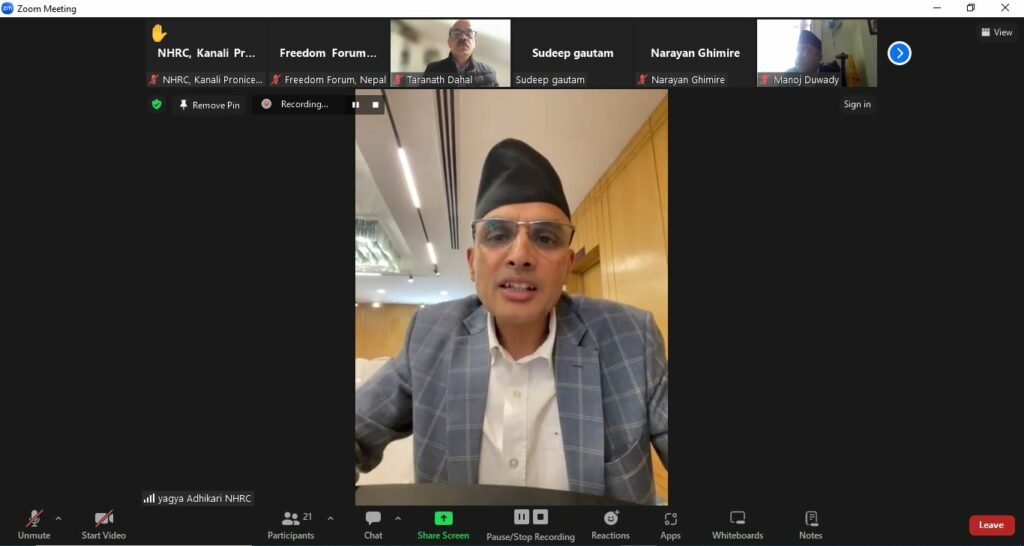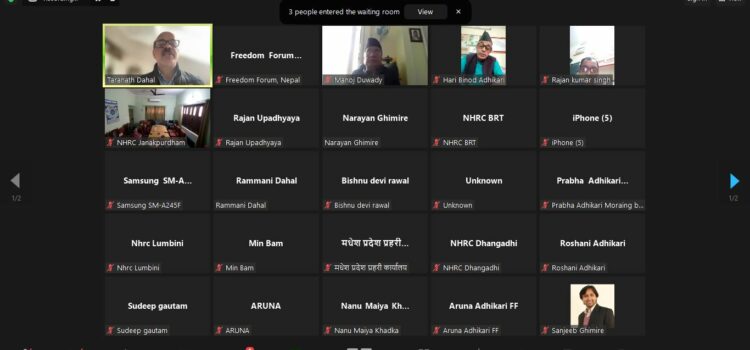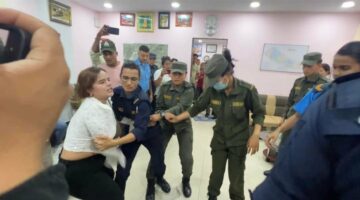Freedom Forum marked the World Press Freedom Day 2024 by organizing a program entitled ‘Press Freedom and Human rights’. It was held on Zoom online platform on May 3.
It was held in collaboration with the National Human Rights Commission (NHRC) Nepal.
Initiating the program, FF’s Executive Chief Taranath Dahal shared with participants the importance of World Press Freedom Day and its historic beginning. It is the Day to celebrate media and journalists’ rights and role to promote democracy and human rights. He said, “The day is celebrated to express solidarity with journalists and media persons who face threats, attacks, imprisonment in course of their work around the world.” This day is also marked to remind states of their fundamental responsibility towards protection of media rights.
Dahal also informed the participants about this year’s theme of celebration connecting free press and its role to address climate crisis. He also expressed worry over the biggest threats of mis/ disinformation to media and journalists who report on elections.
Mr Dahal praised the contribution of NHRC towards protecting freedom of expression and journalists’ safety in Nepal. “NHRC’s recent amendment to its directive relating to journalists’ safety and formation of safety networks at province level are commendable towards promoting democracy and human rights.”
On the occasion, FF’s report on press freedom presented. As per report, FF recorded increase in the incidents of press freedom violations this year as compared to the previous year May 2022/23. According to the report, FF recorded 60 incidents of violation this year which affected 88 media persons- 77 female and 11 male, as compared to 40 incidents affecting 79 journalists last year.
Among total affected, majority journalists (27) faced obstruction followed by attacks upon 25 journalists. Moreover, 34 journalists affiliated to 30 online media got threats and nine journalists got threat via social media. The report also highlighted financial crisis taking a toll on Nepali media, which has badly affected their professional and financial sustainability.
The report made projections for the upcoming year that in the wake of emerging presence of digital media and YouTube journalism, atmosphere conducive for alternative media is essential so that journalists affiliated there can be protected. Digital awareness and skill building of journalists are other components to focus on in future to keep journalists updated on the rapid technological developments.
Similarly, senior Joint Secretary at NHRC Yagya Prasad Adhikari pointed out media’s watchdog role. “Journalists are the voice of the voiceless and act as a bridge between the government and citizens,” Adhikari observed, reminding that fundamental rights of journalists and media are ensured by the Nepal’s constitution.
He also shared latest initiation of NHRC to protect freedom of expression in Nepal with the formation of journalists’ safety mechanism in all seven provinces. These unique mechanisms which will be the source of evidence to record, monitor and investigate FoE issues in the country. It also helps contribute to nation’s reporting to Universal Periodic Review mechanisms.
In the program, Manju Khatiwada from Madhesh Province office of NHRC shared that the office was actively lobbying with concerned sectors to work on free expression and journalists’ safety in the province. She urged the media not to lose credibility. Capacity enhancement of journalists is imperative, according to her. Khatiwada also expressed her team’s commitment to strengthen their collaboration with FF to ensure journalists’ safety in the province and justice to the victims.
Rekha Dutta from Madhesh Province office added to Khatiwada’s views as they had also recorded anti-press incidents where media faced threats for fair reporting. Journalists’ safety is also a big challenge in the province. Hence, a collaborative approach is needed, she underlined.
FF’s representative from Lumbini Province Sudeep Gautam shared updates on media related policy developments in the province. He said that recently brought Communication Policy was not media-friendly and government’s intention to suppress media is really worrying. The province government has not yet listed all the online media currently operating in provinces for public welfare advertisements. Recognition of online media platform is a major challenge in the province, according to him.
Loknath Bastola from NHRC Karnali Province office said the freedom of expression issues should be discussed seriously among general citizens. The province network recently formed has already started looking into the ongoing issues on FoE in the province.
Chairperson at Federation of Nepali Journalists, Madhesh Province Rajesh Kumar Karna shared few incidents where cases of victim journalists were ignored by local administration and even right defenders were yet to pay adequate attention. Media in the province are under threat and journalists face censorship in their profession. Hence, collaborative approach from all the concerned sector is essential, he stressed.
A journalist from Gandaki Province, Ramesh Paudel said that press freedom, as a term has been misused by the elite bodies in society. Political leaders’ opinion towards media which rapidly spread through social media has caused negative impact on overall media credibility. While media should also be accountable, such impacts must be minimized, he stressed.
Honorable member at NHRC, Manoj Duwady opined that FoE is under threat due to the state and political groups’ intolerance towards criticism from journalists and citizens. NHRC is continuously lobbying to protect press rights and FoE through its Directive. The Directive is important to ensure physical security of journalists and press freedom.
Concluding the event, FF’s chairperson Hari Binod Adhikari called upon NHRC, media and civil society to actively collaborate for protection of journalists’ rights and end impunity. While democracy and press freedom are complementary to each other, safety of journalists is essential, he stated.


